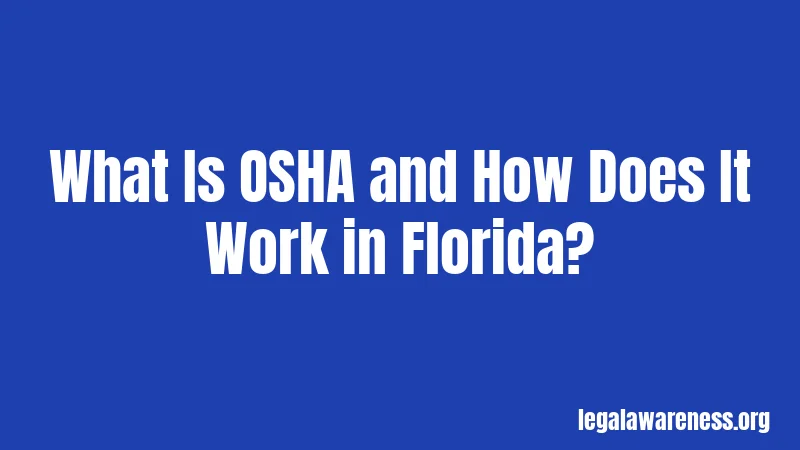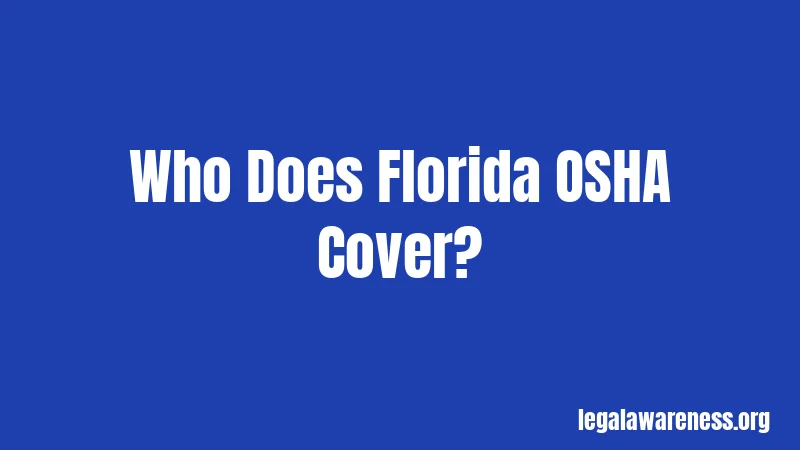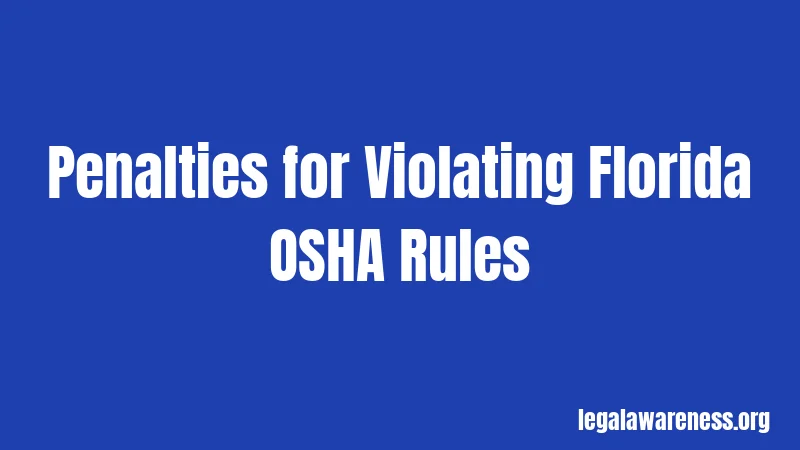OSHA Laws in Florida (2026): Your Complete Safety Guide
Most people working in Florida have no idea how strict workplace safety rules actually are. Seriously. Your boss can’t just ignore injuries or cut corners on safety. If they do, there are real consequences. The rules come from OSHA, a federal agency that cares a lot about keeping workers safe.
Here’s what you need to know. Florida has its own state OSHA program. This means Florida sets and enforces many of its own workplace safety rules. The stakes are real. Violations can cost companies thousands of dollars. Workers can get hurt or worse. Let’s break down what every Floridian should know about these laws.
What Is OSHA and How Does It Work in Florida?

OSHA stands for the Occupational Safety and Health Administration. Think of it as the government’s workplace safety police. They set rules for how businesses should operate safely.
Now here’s where it gets interesting. Florida doesn’t follow federal OSHA directly. Instead, Florida runs its own OSHA program. This means Florida sets its own standards. Florida inspects workplaces. Florida enforces penalties. Sometimes Florida’s rules are stricter than federal rules. Sometimes they’re the same.
Why does this matter? Because the rules that apply to your workplace might be Florida-specific. Your boss needs to follow Florida OSHA rules, not just federal ones. Pretty important distinction, right?
The Basics of Florida Workplace Safety Laws
What Employers Must Do
Your employer has to follow Florida OSHA rules. This isn’t optional. It’s the law.
Employers must provide a safe workplace. That means getting rid of hazards that could hurt workers. They need to train workers on safety. They have to keep records of injuries and illnesses. They must report serious accidents to Florida OSHA.
Honestly, this is the part most employers understand. The tricky part comes next.
What Workers Need to Know
You have rights under Florida OSHA. You can refuse to work in unsafe conditions without losing your job. You can report safety problems to Florida OSHA without getting fired. You can look at injury records for your workplace.
Not sure what counts as a safety violation? Here’s the basic test. If something could reasonably cause injury or illness, it probably needs to be fixed. That might be broken equipment. It could be missing safety guards. It might be workers without proper training or protective gear.
Stay with me here. These aren’t just suggestions. They’re legal requirements.
Who Does Florida OSHA Cover?

This is important to get right. Florida OSHA rules apply to most private employers. Public employees follow different rules. Federal employees follow federal OSHA.
Most businesses need to follow Florida OSHA if they have one or more employees. Small businesses aren’t exempt. Construction companies must follow OSHA rules. Manufacturing plants must. Restaurants, hospitals, and retail stores must too.
Wait, what about federal contractors? They follow federal OSHA standards. Federal OSHA is stricter in some ways. State OSHA in Florida covers nearly everyone else.
One quick note. Self-employed people and family-only businesses have different rules. If you own a company and work alone, some rules don’t apply to you. But if you hire even one employee, Florida OSHA applies to you.
Specific Safety Standards You Need to Know
General Hazard Rules
Florida OSHA requires employers to eliminate hazards. The law is pretty clear about this. If something could cause injury, it has to be controlled or removed.
Common hazards include fall risks, machinery without guards, electrical hazards, and chemical exposures. For each hazard, employers must use what’s called a “hierarchy of controls.” First, they try to eliminate the hazard entirely. If they can’t, they reduce it through engineering controls. If that’s not possible, they provide personal protective equipment. Training comes last.
Think of it like protecting a kid. You wouldn’t just tell them not to touch the stove. You’d put guards on it. You’d teach them it’s hot. That’s the philosophy behind Florida OSHA rules.
Recordkeeping Requirements
Hold on, this part matters. Employers must keep injury records. Really keep them. For every serious injury or illness, there’s a report. These records must be accurate. They must be kept for five years. Workers can request to see them anytime.
Most business injuries must be recorded. This includes broken bones, lost work time, and permanent damage. Minor first aid incidents might not need recording. A small cut that only needs a bandage probably doesn’t get recorded. A hospital visit definitely does.
The form employers use is called Form 300. It looks simple but requires accurate information. Employers can’t hide or minimize injuries. Florida OSHA inspectors check these records during investigations.
Hazard Communication
Employees need to know about chemical hazards. Period. Employers must provide information about dangerous chemicals in the workplace.
This comes down to three things. First, chemicals need proper labels. Second, workers need information sheets about each chemical. These are called Safety Data Sheets or SDS. Third, workers need training on how to handle chemicals safely.
Makes sense, right? You can’t protect yourself from something you don’t know about.
Penalties for Violating Florida OSHA Rules

Here’s where it gets serious. Violating Florida OSHA rules isn’t free. The penalties hit hard.
For general violations, employers face fines up to $10,781 per violation. That’s serious money. Willful violations cost even more. Penalties can reach $53,904 per violation. Criminal violations can result in jail time and even larger fines.
Think of it like a traffic ticket, but way more expensive. One violation might seem manageable. But most businesses have multiple violations. Fines add up quickly.
Worse violations get worse penalties. If someone gets hurt because of the violation, penalties are higher. If the same violation happens twice, penalties double. Intentional violations cost the most.
Let me break down the different violation types. A serious violation means there’s substantial likelihood of death or serious injury. These cost more than general violations. Willful violations are intentional or with reckless disregard. These cost the most. Repeat violations mean the same violation was found before.
What Happens During Investigations
Florida OSHA inspectors can show up without warning. They can inspect any workplace anytime. They can talk to workers. They can look at records. They can take photos and samples.
Workers can ask an inspector to speak privately. Employees can tell inspectors about safety problems without fear of retaliation. If a worker requests an inspection, OSHA will keep their name confidential.
Inspections usually result in a report. If violations are found, the employer gets a citation. The citation explains the problem. It explains the penalty. The employer has time to appeal or fix the problem.
Special Rules for High-Risk Industries
Construction Safety
Construction has special rules under Florida OSHA. Building sites are dangerous places. Workers face fall risks, electrical hazards, and heavy machinery.
Construction employers must have a qualified safety person. Scaffolding must be properly installed and inspected. Fall protection is required on heights over six feet. Trenches must be properly shored or sloped. Heavy equipment must be operated by trained workers.
These rules are strict. Inspectors focus hard on construction sites. Penalties are high because construction accidents are serious.
Electrical Work
Working with electricity is dangerous. Florida OSHA has detailed electrical standards.
Electrical equipment must be properly grounded. Circuits must have proper protection. Extension cords need to be in good condition. Workers need proper training. Arc flash hazards must be controlled.
One quick thing. DIY electrical work isn’t really a violation unless it’s in a business setting. Home electrical work follows different building codes. But if your business involves electricity, Florida OSHA rules apply strictly.
Healthcare Settings
Hospitals and clinics deal with unique hazards. Bloodborne pathogen exposure is a major concern. Infection control procedures must be in place.
Healthcare workers need hepatitis B vaccination. Needles must be disposed of properly. Personal protective equipment must always be available. Procedures for handling exposure must exist.
Florida OSHA also focuses on violence prevention in healthcare. Workers report assaults. Employers must have plans to prevent workplace violence. This includes training and security measures.
Chemical Handling
Any workplace with chemicals has specific requirements. Hazard Communication rules apply strictly.
Every chemical needs a label. Every product needs a Safety Data Sheet. Workers need training on chemicals they handle. Employers must keep records of chemical inventory.
This sounds basic, but many employers skip steps. They might assume workers know chemicals are dangerous. They might not provide proper sheets. They might not train workers. All of these are violations.
Recent Changes and Updates to Florida OSHA Rules
Florida OSHA updated several standards recently. Heat illness prevention became a bigger focus. With Florida’s hot climate, heat-related injuries happen often.
Employers must now provide water access. Shade must be available. Workers need break time in cool areas. New workers need gradual heat acclimatization. Supervisors need to watch for heat illness signs.
These rules took effect to reduce heat injuries. Florida summers are brutal. Without proper protections, workers collapse or die from heat exhaustion.
Another recent focus is mental health and workplace violence. Florida now requires violence prevention plans in certain settings. Healthcare workers and retail employees are especially protected.
Remote work also created new standards. Employers must assess home office safety. Ergonomic hazards must be addressed. Safe equipment must be provided.
What to Do If You Face a Safety Violation
For Employers
Okay, if you own a business and got cited for a violation, here’s what happens next. First, read the citation carefully. Understand what the violation is. Understand the penalty amount.
You have options. You can pay the penalty. You can request an informal conference with the inspector. You can request a formal hearing before a judge. You can appeal the decision.
Most employers contact a safety consultant. These folks help assess the violation. They help create a fix. They might help with the appeal process.
Honestly, the best move is prevention. Get a safety audit before OSHA does. Fix problems on your own. Train your workers properly. Keep good records. This saves money and protects workers.
For Workers
If your workplace isn’t safe, you have options. First, tell your employer about the problem. Most problems get fixed when management knows about them.
If your employer doesn’t respond, you can contact Florida OSHA. Call 1-800-321-OSHA. You can file a complaint online. You can request an inspection. OSHA will investigate.
Your employer can’t fire you for reporting safety problems. This is illegal retaliation. If your boss fires you after you report a violation, that’s a separate crime. You can sue and likely win.
Don’t be afraid to speak up. Worker safety is the whole point of these laws.
How to Prepare Your Workplace for OSHA Compliance
Creating a Safety Program
Start by assessing hazards. Walk through your workplace. What could hurt someone? Make a list. That’s your baseline.
Next, develop procedures to control each hazard. Document these procedures. Train all workers on them. Keep training records.
Appoint someone responsible for safety. This person tracks compliance. They investigate incidents. They update procedures when needed.
Hold regular safety meetings. Discuss hazards. Talk about incidents. Share updates. These meetings show workers that safety matters.
Documentation and Records
Keep injury records like OSHA requires. Use Form 300. Keep them accurate. Don’t alter records. Update them when incidents occur.
Keep training records too. Document who trained workers. Document what was covered. Document when training happened.
Keep maintenance records. Document equipment inspections. Document repairs. Document testing results.
These records protect you. If OSHA inspects, good records show you’re serious about safety. Bad records or no records suggest negligence. Courts and inspectors notice.
Training Employees
Train every new employee on safety. Don’t assume they know the rules. Cover hazards in their job. Cover emergency procedures. Cover your safety program.
Update training when procedures change. Update training when equipment changes. Update training when new hazards appear.
Use real examples. Show actual injuries that happened. Explain what went wrong. Explain how better practices prevent injuries.
Make training interactive. Let workers ask questions. Let them practice safety procedures. Make them part of the solution.
Frequently Asked Questions
Can I refuse to work if I think a task is unsafe?
Yes. You have the right to refuse unsafe work. Your employer can’t fire you for this. You should report the concern first and ask for it to be fixed. If the employer doesn’t fix it and you still refuse, that’s protected. Document what you reported and when.
What’s the difference between Florida OSHA and federal OSHA?
Florida runs its own OSHA program instead of federal OSHA. Florida sets its own standards. Florida inspects workplaces. Florida enforces penalties. Federal OSHA covers federal employees and contractors. State OSHA covers nearly everyone else in Florida.
How often does OSHA inspect workplaces in Florida?
OSHA inspects based on risk level and complaints. High-risk workplaces get inspected more often. Complaint-based inspections happen when workers report problems. Random inspections happen less frequently for safer industries. Inspections can happen anytime without warning.
What should I do if OSHA finds violations at my workplace?
Read the citation carefully. Understand each violation. Determine what needs fixing. Fix the problems within the timeline OSHA gives you. Keep documentation of fixes. Consider hiring a safety consultant. Decide if you want to contest the violation or accept the penalty.
Are small businesses exempt from OSHA rules?
No. Small businesses must follow OSHA rules too. If you have one employee, OSHA applies. Business size doesn’t matter. The only exemptions are self-employed people with no employees and family-only businesses.
How do I report a safety violation to Florida OSHA?
Call 1-800-321-OSHA. That’s 1-800-321-6742. You can also file a complaint online at osha.gov. You can request an inspection. Provide details about the hazard. Explain why it’s dangerous. Your contact information stays confidential if you request it.
Can a worker get in trouble for reporting safety issues?
No. It’s illegal for employers to retaliate against workers for reporting safety problems. This includes firing, demotion, reduced hours, or harassment. If retaliation happens, you can sue. You can file a complaint with Florida OSHA. You can contact the National Labor Relations Board.
What is the most common OSHA violation in Florida?
Fall protection violations are extremely common. Employers often fail to provide proper fall equipment. They fail to train workers on fall risks. Workers work at heights without harnesses or guardrails. Heat-related violations are also common in Florida because of the climate.
Final Thoughts
Now you know the basics of Florida OSHA rules. Whether you’re an employer or worker, safety matters. Serious injuries change lives. The rules exist to prevent that.
If you own a business, take compliance seriously. Get a safety audit. Train your workers. Fix hazards. Keep good records. It’s cheaper than penalties and it protects people.
If you work in Florida, know your rights. Report unsafe conditions. Refuse unsafe work if needed. Don’t be afraid to speak up. Your safety matters.
When in doubt, ask questions. Contact Florida OSHA. Hire a safety professional. Look up the specific rules for your industry. These laws exist to protect you.
Stay safe out there.
References
- Florida Department of Labor and Employment – OSHA Program
- OSHA Official Website – State Plans
- Florida OSHA – Complaint and Inspection Process
- OSHA – Heat Illness Prevention Resources
- Florida Administrative Code – Chapter 61-30 (OSHA Standards)
- OSHA – Workplace Violence Prevention
- Florida Department of Labor – Safety Standards
